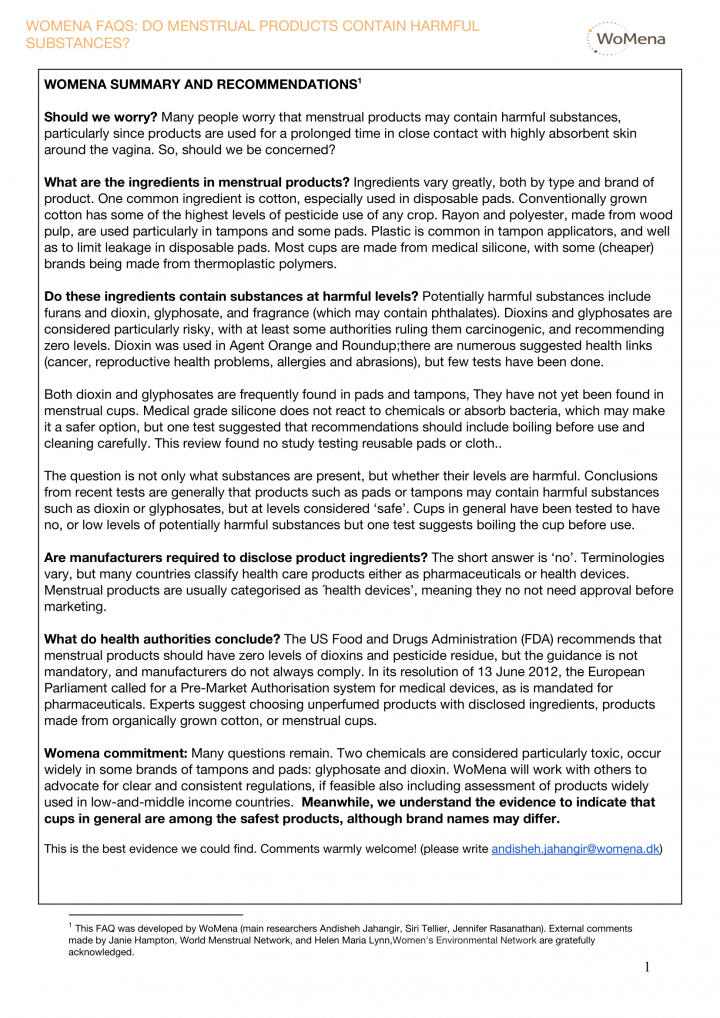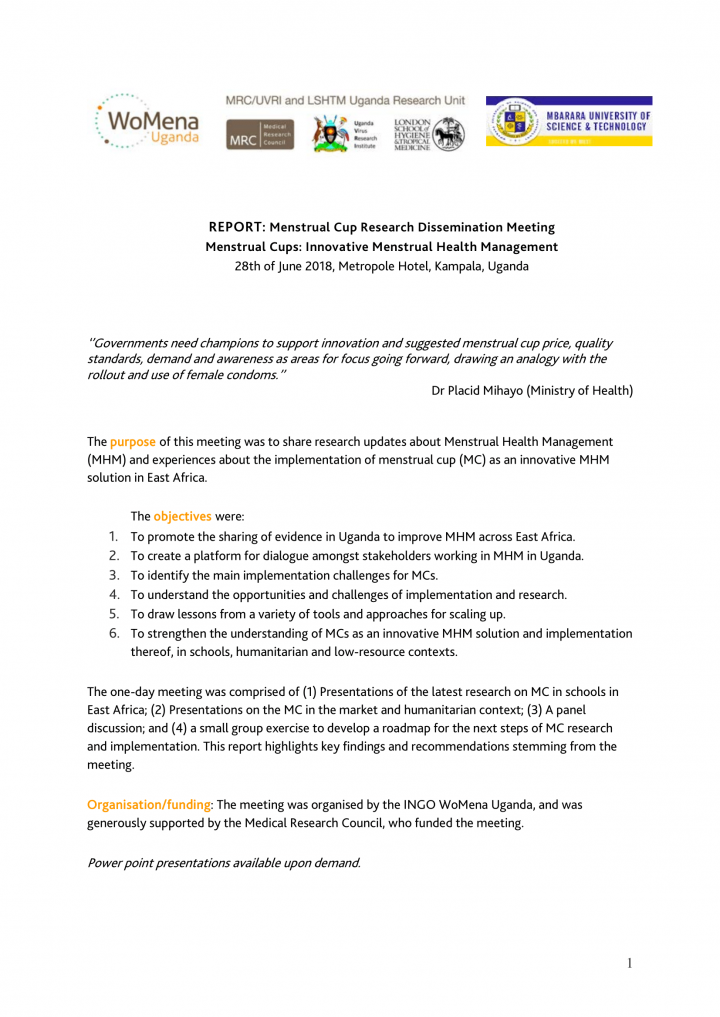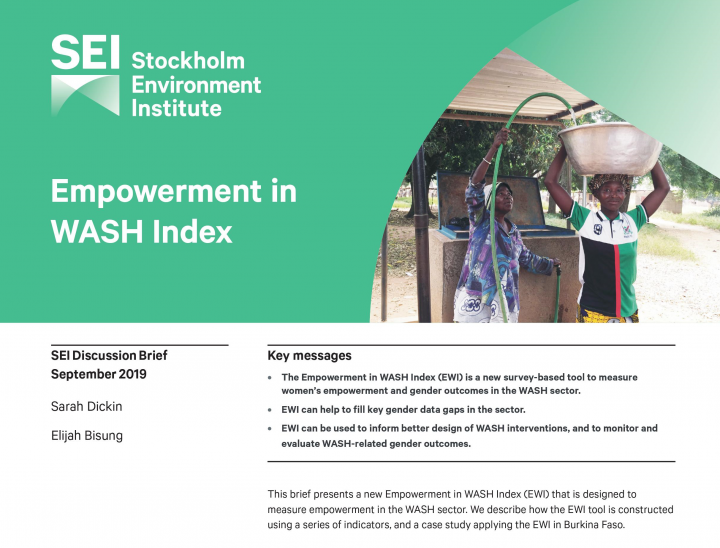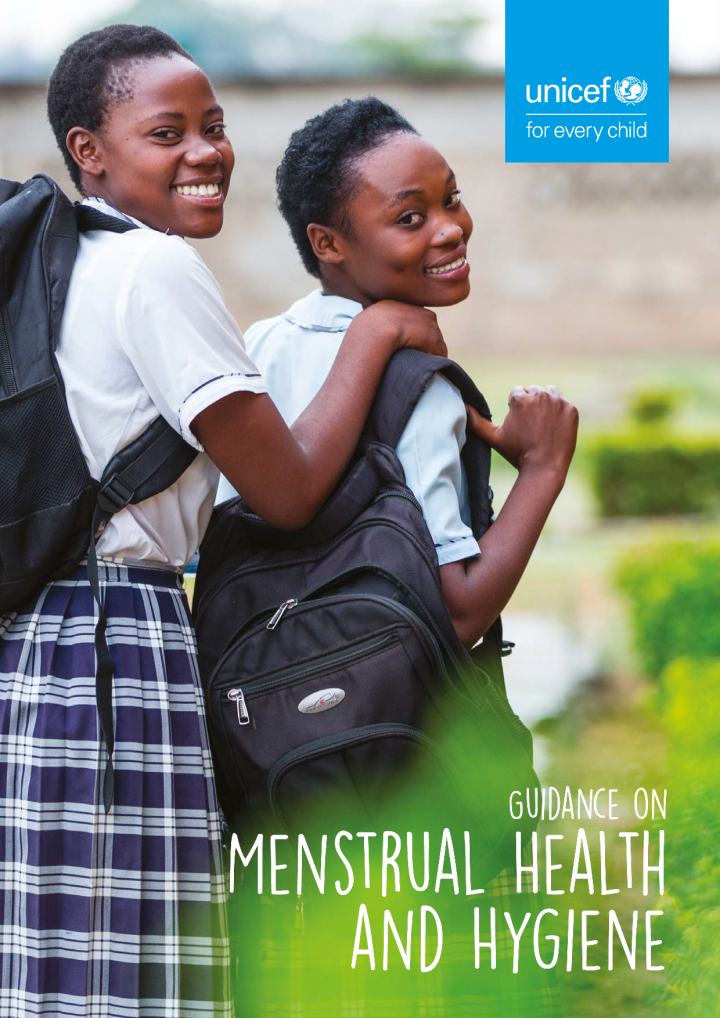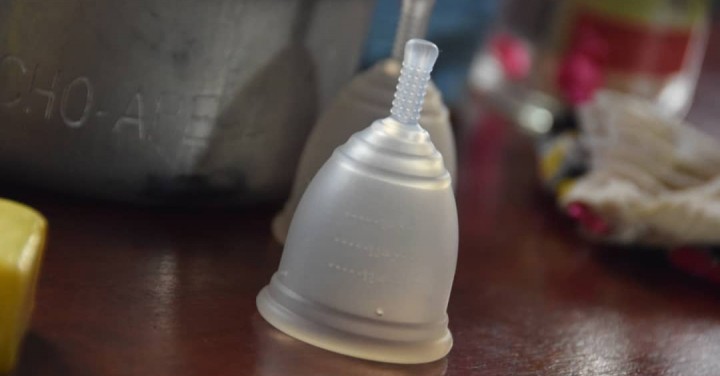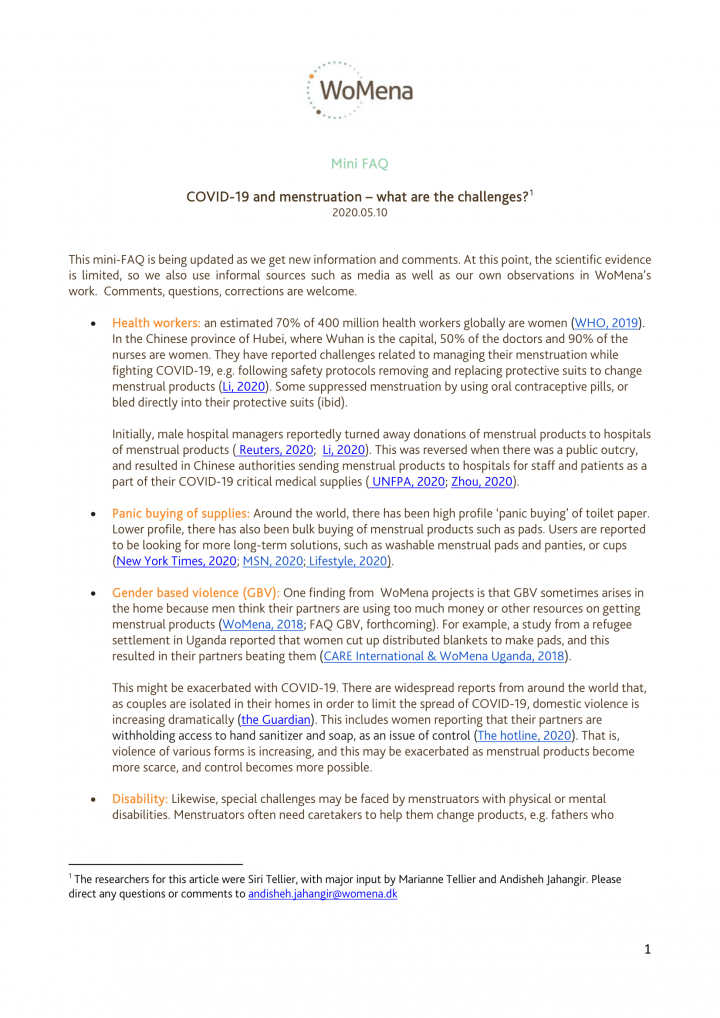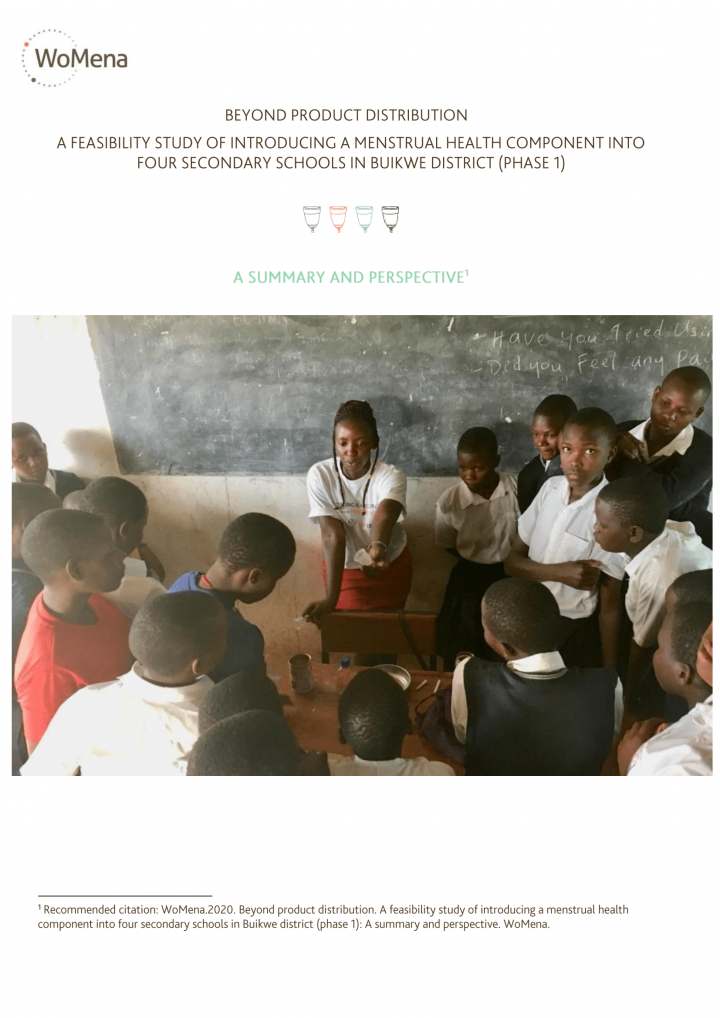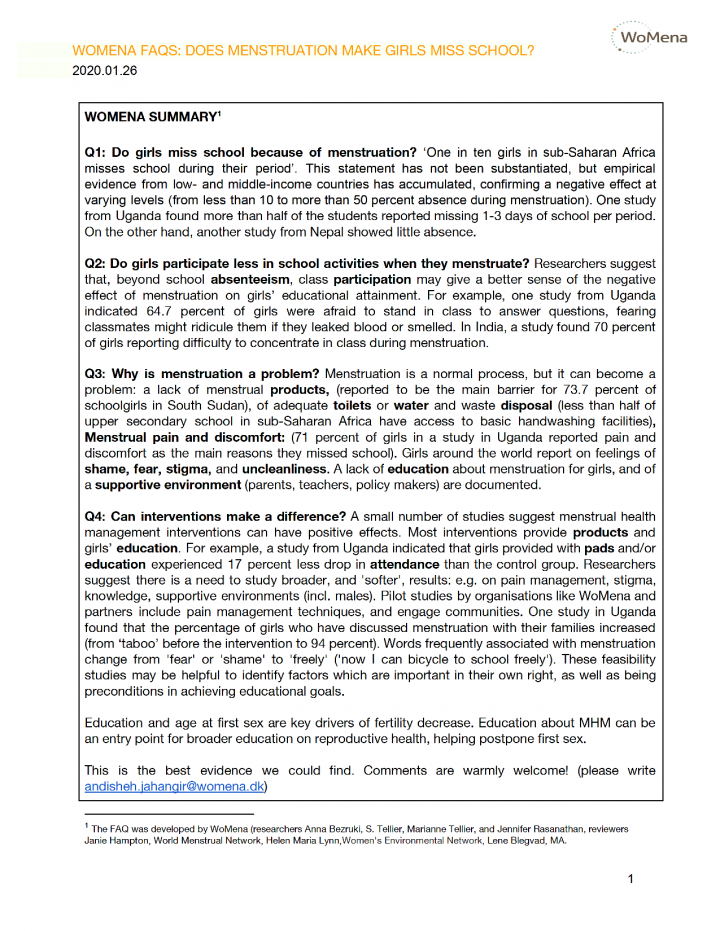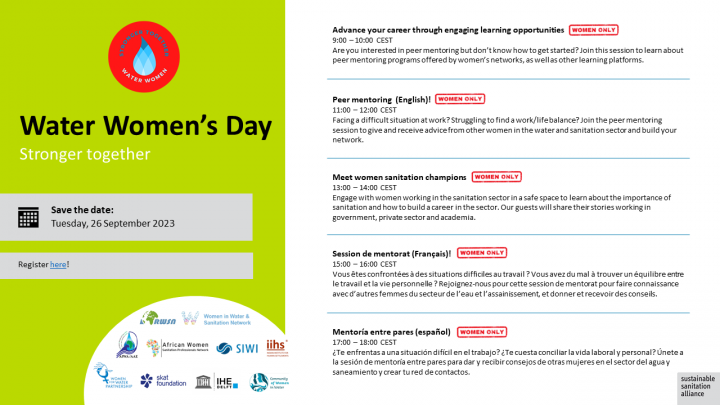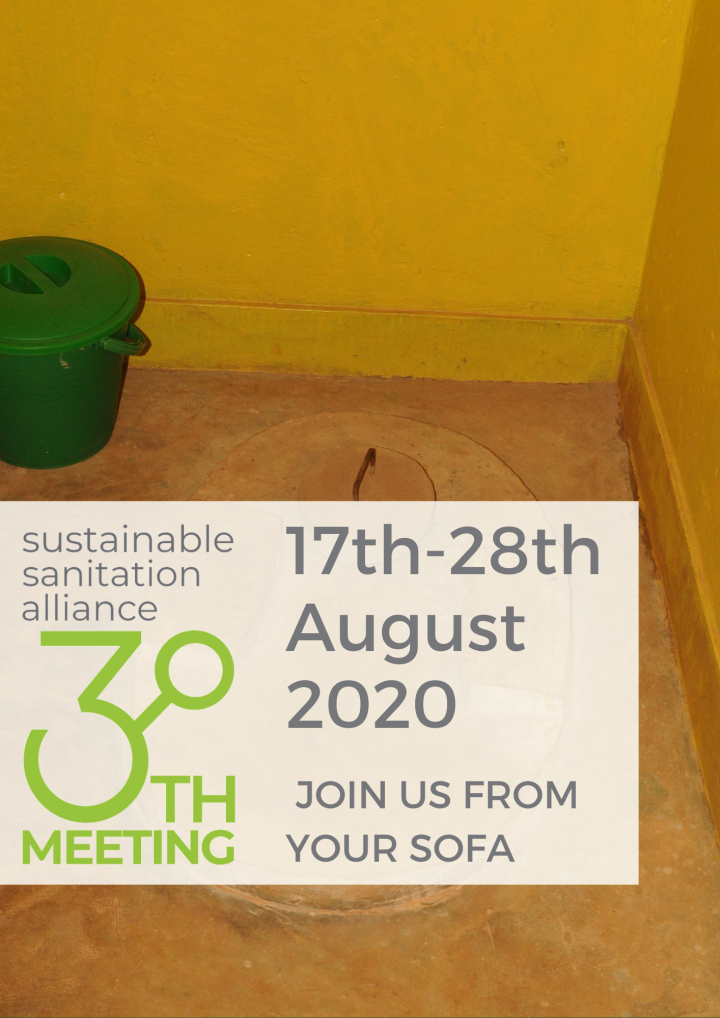Searching for information on Sanitation Workers?
The Sanitation Workers Knowledge + Learning Hub is the best source for all current news, trends, articles and updates on sanitation workers rights around the world.
Should we worry? Many people worry that menstrual products may contain harmful substances, particularly since products are used for a prolonged time in close contact with highly absorbent skin around the vagina. So, should we be concerned?
What are the ingredients in menstrual products? Ingredients vary greatly, both by type and brand of product. One common ingredient is cotton, especially …
The Canadian water, sanitation and hygiene (WASH) sector welcomes Canada’s new Feminist International Assistance Policy, a bold rights-based framework to guide Canada’s international development efforts that places gender equality and the empowerment of women and girls at the heart of poverty reduction. Based on the contributions of 17 organizations and individuals, this position paper …
The purpose of this meeting was to share research updates about Menstrual Health Management
(MHM) and experiences about the implementation of the menstrual cup (MC) as an innovative MHM
solution in East Africa.
The objectives were:
1. To promote the sharing of evidence in Uganda to improve MHM across East Africa.
2. To create a platform for dialogue amongst stakeholders working in MHM in …
Utilities can play an important role in reducing and eliminating barriers faced by women. This study presents a first-of-its-kind analysis that aims to heighten understanding of key barriers and bottlenecks that women face in their career in the water sector and identify interventions that water companies can put in place to increase gender diversity in the water workforce. The report draws on …
Water, sanitation and hygiene (WASH) for urban populations is one of UNICEF’s emerging areas of focus, highlighted in its Global WASH Strategy (2016–2030). ‘Megacities’ have unique challenges, and often house disproportionately high numbers of women and children who are severely neglected in terms of access to WASH and other essential services. Over many years, UNICEF Bangladesh has been …
This Technology Application Framework (TAF) Publication assesses two low-cost sanitary pad machines placed in women’s collectives in Nepal.
The German Development Cooperation through GIZ has started to be involved in Menstrual Health after the 2015 earthquake. A programme implemented by Nepal’s Ministry of Health and Population and facilitated by the German Development Cooperation has sought …
This factsheet is outlining current menstrual health and hygiene developments in Nepal. It also highlights the problems many girls and women encounter in accessing sanitary products.
In order to address this the production of sanitary pads by local women's cooperatives using sanitary pad machines, is supported by German Development Cooperation. These processes of facilitating the procurement …
This brief presents a new Empowerment in WASH Index (EWI) that is designed to measure empowerment in the WASH sector. We describe how the EWI tool is constructed using a series of indicators, and a case study applying the EWI in Burkina Faso.
The EWI measures agency, participation and empowerment in the water and sanitation sector. The Index is made up of indicators to assess empowerment in …
This publication summarizes the sanitation and hygiene hopes and aspirations of thousands of women and men of different ages and physical ability, across rural and urban areas in eight South Asian countries. In these countries, over a billion people are without safe sanitation. They represent individuals and groups rarely heard because they are seldom asked what their constraints are, what they …
The crucial role women play in managing and safeguarding water at the domestic and community level has long been recognized. Across the world, women and girls bear the brunt of collecting water—often from long distances or in harsh conditions—and usually bear responsibility for household hygiene and sanitation needs. What has been less explored is the intersection between water, gender, and …
This publication is intended to deepen the understanding of the biological nature of the menstruation phenomenon in order to reclaim and restore the pride and confidence that should naturally be a part of it. Managing menstruation hygienically with linked sanitary facilities is an important aspect of life – the practical dimensions of which this publication also aims to facilitate – resulting …
This Programming Guidance outlines essential parts of MHH programming, characteristics of good programming and examples of good practice.
It features 5 main sections:
- A global opportunity: explaining the global interest in supporting MHH
- Programm design: principles, government leadership, situation analysis, theory of change, costs
- Core package of interventions: framework of essential …
WoMena receives many questions from the women and girls we reach out to, from our trainers and our partners. Therefore, the team collect a series of questions and answers regarding topics like Menstrual Cups functionality, maintenance, health & safety, economy, and other concerns.
WoMena periodically update the questions and answers.
This mini-FAQ is being updated as we get new information and comments. At this point, the scientific evidence is limited, so we also use informal sources such as media as well as our own observations in WoMena’s work. Comments, questions, corrections are welcome.
WoMena’s contribution: WoMena works in a wide range of contexts in Uganda, including refugee settlements. In the COVID-19 …
EXECUTIVE SUMMARY
In Sub-Saharan Africa (SSA), menstrual health is often considered a taboo and many girls and women lack access to safe and appropriate menstrual health management (MHM) products. This can have far-reaching implications for women and girls’ physical, social and mental wellbeing, as well as for their sexual reproductive health and rights. These MHM issues are often further …
On the 2nd of December, SuSanA Africa Regional Chapter in collaboration with the Africa Civil Society Network on Water and Sanitation (ANEW) hosted a webinar on the topic:
Innovative and evidence-based water initiatives that advance water sector transformation and catalyze systems change for improved gender equity. Questions, such as "What is being done?" and "What more do we need to do?" will …
Many women and girls worldwide do not have the knowledge, skills, services, and products or support to ensure their well-being during menstruation. Due to the link of menstruation with health, education, water and sanitation, and socio-economic factors, these challenges are even more urgent for those who menstruate in low- and middle- income countries (LMICs). At the same time, there is evidence …
Q1: Do girls miss school because of menstruation? ‘One in ten girls in sub-Saharan Africa misses school during their period’. This truism has not been substantiated, but empirical evidence from low- and middle-income countries has accumulated, confirming a negative effect at varying levels (from less than 10 to more than 50 percent absence during menstruation). One study from Uganda found …
Phidim Municipality was declared as municipality on 18th May 2014. It is in Panchthar District, Koshi Province in the eastern Nepal. It is divided into 14 political wards. The municipality has a total population of 48,495 with 23,679 males and 24,816 females (Census 2021, n.d.). Out of total wards, ward number 1 has the largest population (8,944) while ward number 9 has the least population with …
The SuSanA Secretariat hosted the Second virtual Water Women’s Day on Tuesday, 26 September in collaboration with the Community of Women in Water, Women in Water & Sanitation Network, African Women Sanitation Professionals Network, SIWI’s Women in Water Diplomacy Network in the Nile and Central Asia & Afghanistan, African Water and Sanitation Association, Rural Water Supply Network, Women for …
Ilam Municipality is in Ilam district, Koshi province of Nepal. The municipality was established in 1958; one of the oldest municipalities in Nepal. It has 12 wards and covers the area of 173.32 sq km. It is surrounded by Maijogmai rural Municipality and Suryodaya Municipality in the east, Sandakpur Municipality and Panchthar Distict in the north, Deumai Municipality in the west, and Mai and …
Bardibas Municipality is located in Mahottari District, Madhesh Province of Nepal. It has total 14 wards and covers the area of 315.57 square kilometres. It is surrounded by Kamalamai Municipality of Sindhuli District in North, Aurahi and Bhangaha Municipalities in south, Dhanusha District in the east and Sarlahi District in the west. According to national population and housing census 2021, …
Rajpur Municipality was established in 2016. The municipality is located in Rautahat District, Madhesh Province. The municipality is divided into nine political wards. The municipality has a total population of 54,083 with 26,574 males and 27,509 females (Census 2021, n.d.). Out of total wards, ward number 1 has the largest population (7,801) while ward number 8 has the least population (4,193). …
The 30th SuSanA meeting - the first virtual of its kind - took place from August 17th to August 28th 2020. It was organised by the SuSana Secretariat with support and contributions from SuSanA Partners, Members, Working Groups and Regional Chapters.
This entry is the collection point of the different resources from the SuSanA Meeting, including recordings, presentations, flyers and program …
This briefing paper informs about a study carried out by the Container Based Sanitation Alliance (CBSA). Working with the carbon finance consultancy South Pole, five CBS operators were examined. The results show that their projects would eliminate 79% to 93% of baseline emissions, depending on the treatment methods used and contextual parameters.
The study of five CBS operators shows that …

